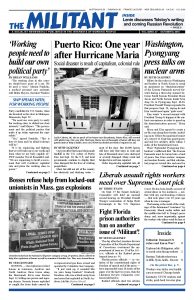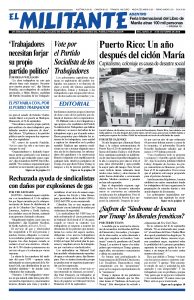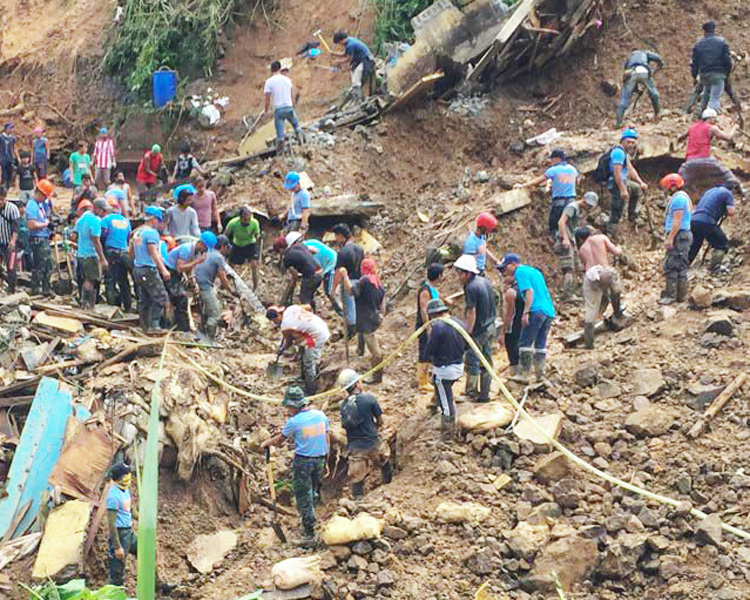MANILA, Philippines — Typhoon Mangkhut, named Ompong here, slammed into northern Luzon, the largest island in the north of the archipelago, Sept. 15. With torrential rains and sustained winds of 105 mph gusting up to 160 mph, the Category 5 equivalent storm caused disastrous flooding, high storm surges and deadly landslides. It also destroyed houses and fields, while disrupting power supplies and transport in the country’s main agricultural zone.
The destruction was worsened by earlier saturating monsoon rains. But the social calamity from the tropical storm is directly attributable to the workings of capitalism and underdevelopment perpetuated by imperialist exploitation. This has left working people in the coastal countryside and mountain areas most vulnerable to the many tropical cyclones that strike the country.
Over 130,000 people were evacuated from low-lying areas to more than 1,000 emergency centers. Almost 1 million were directly struck by the superstorm as it crossed the island, with 10 million people lashed by extreme weather. Indigenous people dependent on subsistence farming or fishing were hit hard.
As of Sept. 23 the death toll had risen to 95, with many still missing. The largest single calamity occurred in Itogon, Benguet, where dozens of “pocket” gold miners and family members were buried alive when a giant mudslide covered a bunkhouse-cum-chapel where they were sheltering.
The hillside had been undermined by previous large-scale mining now abandoned, while authorities turned a blind eye to the perilous illegal mining operations that continued across the honey-combed mountainside. Like other areas where landslides occurred, it had been denuded of trees by mining and timber companies.
Police had told the workers to evacuate as the typhoon approached but they were reluctant to leave the site, their sole source of livelihood.
Filipino Environment Secretary Roy Cimatu demanded cops enforce a ban on pocket mining. This would affect the livelihood of tens of thousands who he claimed were guilty of “mining without permit or theft of minerals.” At the same time he reassured capitalist mining interests this order “does not cover big-scale mining.”
In addition to the human toll, the typhoon has added to another social disaster — soaring prices on basic food and fuel, the highest in a decade. This inflation is driving millions of toilers deeper into poverty.
A quarter of a million tons of rice, one month away from harvest, was lost. Fields of corn and other crops were flattened, fisheries damaged and livestock numbers depleted.
“The price of vegetables, mainly grown in the north, has shot up,” Linette Chua, a Filipina Chinese-English translator, told the Militant a week after the storm. This began with the heavy “monsoon weather of the past several months,” she said, but the typhoon “wiped out roads and disrupted vegetable supplies to the capital, Manila.”
Even before the storm struck, a shortage of the cheapest palay (unmilled) rice had caused the price of regularly milled rice to soar by more than 20 percent. The inflationary crisis was the lead item on the news for days prior to the approach of Ompong. Price increases on staple goods are the highest in nearly a decade, at 6.4 percent in August alone.
Rampant inflation
The government of President Rodrigo Duterte has announced the intention to try to stem price hikes by importing even more rice and sugar.
The Philippines, already one of the world’s largest rice importers, buys the grain more cheaply from Vietnam and also Thailand than from domestic growers. Vietnamese rice is cheaper as greater productivity of labor through mechanization, better irrigation systems and higher quality seed lowers the cost of production there compared to Filipino farmers.
Rice farms in Vietnam also produce three crops per year as against two in the Philippines.
The government National Food Authority, responsible for providing basic supplies of rice, buys the unmilled grain from local farmers for 17 Filipino pesos per kilogram (31 cents per 2.2 pounds). Private traders offer farmers more than 20 pesos. Rice hoarding by traders is also widespread.
Inflation has been sharpened by a jump in fuel prices from rising world crude oil costs as well, combined with the Philippine peso’s falling exchange rate in the wake of currency depreciations in “emerging economies” from Turkey to Argentina.
Manila, like other capitalist governments, is shifting the burden onto working people by increasing sales taxes on diesel, kerosene and cooking gas, as well as taxing shipping fuel and coal used in electricity generation. The liberal press, the bourgeois opposition Liberal Party and the leftist Makabayan bloc are calling for these tax hikes to be suspended to alleviate some price increases.
In a growing bid to oust Duterte, his capitalist rivals blame him for causing the inflation and typhoon-caused social calamities. Duterte in turn blames “over-mining” and “food supply shocks.” All deny the real source of the man-made disasters — the inevitable workings of the capitalist system.
Imperialist powers in the Pacific from the United States to Australia, which have historically profited greatly from mining and other superexploitation of land and labor in the semicolonial country, have promised token emergency supplies in the wake of the typhoon.


